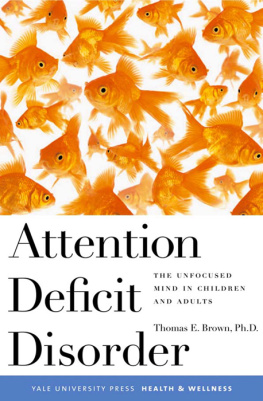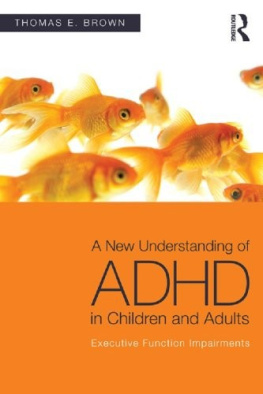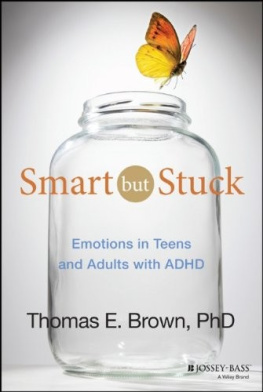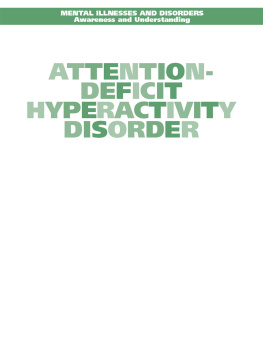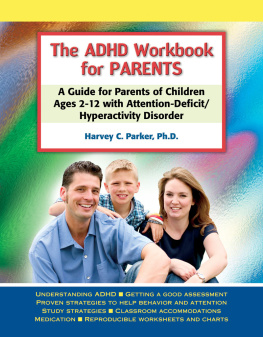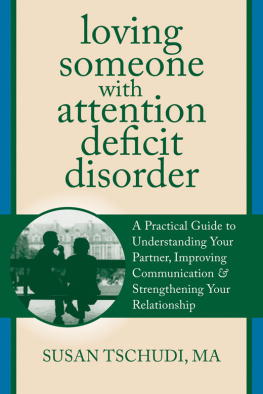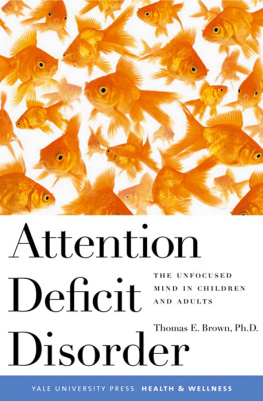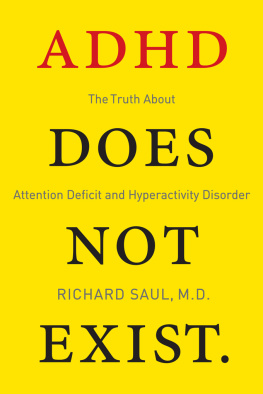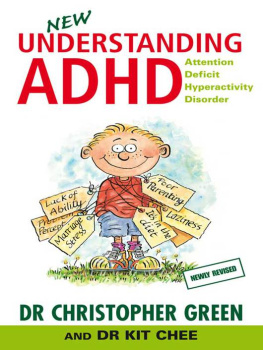Attention Deficit Disorder
Yale University Press Health & Wellness
A Yale University Press Health & Wellness book is an authoritative, accessible source of information on a health-related topic. It may provide guidance to help you lead a healthy life, examine your treatment options for a specific condition or disease, situate a healthcare issue in the context of your life as a whole, or address questions or concerns that linger after visits to your healthcare provider.
Thomas E. Brown, Ph.D., Attention Deficit Disorder: The Unfocused Mind in Children and Adults
Ruth Grobstein, M.D., Ph.D., The Breast Cancer Book: What You Need to Know to Make Informed Decisions
James Hicks, M.D., Fifty Signs of Mental Illness: A Guide to Understanding Mental Health
Mary Jane Minkin, M.D., and Carol V. Wright, Ph.D., A Womans Guide to Menopause and Perimenopause
Mary Jane Minkin, M.D., and Carol V. Wright, Ph.D., A Womans Guide to Sexual Health
Catherine M. Poole, with DuPont Guerry IV, M.D., Melanoma: Prevention, Detection, and Treatment, 2d ed.
The information and suggestions contained in this book are not intended to replace the services of your physician or caregiver. Because each person and each medical situation is unique, you should consult your own physician to get answers to your personal questions, to evaluate any symptoms you may have, or to receive suggestions on appropriate medications.
The author has attempted to make this book as accurate and up-to-date as possible, but it may nevertheless contain errors, omissions, or material that is out-of-date at the time you read it. Neither the author nor the publisher has any legal responsibility or liability for errors, omissions, out-of-date material, or the readers application of the medical information or advice contained in this book.
Copyright 2005 by Thomas E. Brown. All rights reserved. This book may not be reproduced, in whole or in part, including illustrations, in any form (beyond that copying permitted by Sections 107 and 108 of the U.S. Copyright Law and except by reviewers for the public press), without written permission from the publishers.
Designed by Rebecca Gibb. Set in Scala type by Integrated Publishing Solutions. Printed in the United States of America.
Library of Congress Cataloging-in-Publication Data
Brown, Thomas E., Ph. D.
Attention deficit disorder : the unfocused mind in children and adults /
Thomas E. Brown
p. cm. (Yale University Press health & wellness)
Includes bibliographical references and index.
ISBN 0-300-10641-6 (alk. paper)
1. Attention-deficit hyperactivity disorder. 2. Attention-deficit disorder in adults.
I. Title. II. Series.
RJ506.H9B765 2005
616.8589dc22
2005040895
A catalogue record for this book is available from the British Library. The paper in this book meets the guidelines for permanence and durability of the Committee on Production Guidelines for Book Longevity of the Council on Library Resources.
10 9 8 7 6 5 4 3 2 1
To my wife, Bobbie, with continuing love and gratitude for all you are, all you give, and all we share together
As physicians strive to gather more data, to see more, to be more objective, to be more scientific, they are often experienced by their patients as not listening. Listening is central to learning about and coming to understand a sufferer. The healer learns about the sufferer in direct proportion to the quantity and quality of his listening.
Stanley W. Jackson, M.D., The Listening Healer in the History of Psychological Healing (1992)
The untangling of the complexity has barely begun. But even at its early stages, the whole business of the matter of the mind requires a global view if we are to get anywhere.
Gerald M. Edelman, M.D., Ph.D., Bright Air, Brilliant Fire:
On the Matter of the Mind (1992)
Contents
Preface
Over the past decade hundreds of thousands of children, adolescents, and adults have been diagnosed and treated for attention deficit disorder (ADD) or attention-deficit hyperactivity disorder (ADHD). Advocacy groups for individuals and families affected with ADD/ADHD are burgeoning not only in the United States and Canada, but also in the United Kingdom, Germany, Australia, Mexico, Norway, Spain, Japan, and many other diverse cultures around the world.
Despite this popular groundswell and a tremendous amount of scientific evidence supporting the validity of the ADHD diagnosis and the safety and effectiveness of available treatments, a large segment of those in the popular media and many individuals remain skeptical; they consider ADD a trivial problem that is often overdiagnosed and overtreated. Most of this skepticism is based on simple ignorance about the complex nature of the disorder, its often devastating effects on individuals and families, and the safe, effective benefits obtained by the vast majority of those who receive appropriate treatment.
Over the past twenty years I have assessed and helped to provide treatment for thousands of children, adolescents, and adults who suffer from attention deficit disorders. I have studied and participated in relevant scientific research. I have traveled throughout the United States and in twentyfive other countries to consult with professionals and laypersons about ADHD and to offer lectures and professional education workshops. These experiences have convinced me that there is a continuing and widespread need for a clear, scientifically based explanation of what ADD/ADHD is, what it isnt, and how it can effectively be recognized and treated.
Thirty-six years ago, when I began studying psychology at Yale, we did not have the powerful imaging tools that now make it possible to look within the living human brain and observe moment to moment changes in its neural networks. We were, however, taught another way to learn about problems of brain function: to listen carefully to the way patients describe their experiences.
I have written Attention Deficit Disorder to describe what Ive learned from conversations with thousands of children, adolescents, and adults who have ADHD. I hope it will be of interest to a wide range of readers in the general public: those who encounter these problems in themselves, family, or friends, and those who simply want to gain a fresh perspective on the fascinating complexity of the human brain. I hope it will also be useful for psychologists, educators, psychiatrists, pediatricians, family practice physicians, internists, social workers, human resource managers, counselors, and other professionals who want to better provide understanding and appropriate support to individuals who suffer from the difficulties described here.
The path to writing this book began one day as I listened to a very bright high school student describe frustrations that interfered daily with his schoolwork. He complained that he could read fluently, but moments later could not recall what he had just read. He said that his mind repeatedly took long excursions in almost every class. Often he was unable to stay focused enough to catch more than snippets of the lecture or class discussion. He explained that despite good intentions to prepare homework and write papers, he ended up procrastinating on assignments and got the inevitable poor results. Something about his description of these persistent struggles made them sound more like problems of cant than problems of wont.
The boys descriptions led me to suspect he had an attention deficit disorder that had remained undiagnosed because he was bright and not hyperactive or disruptive. A trial of stimulant medication brought sudden and dramatic improvements in virtually all of his attentional impairments.
Next page
